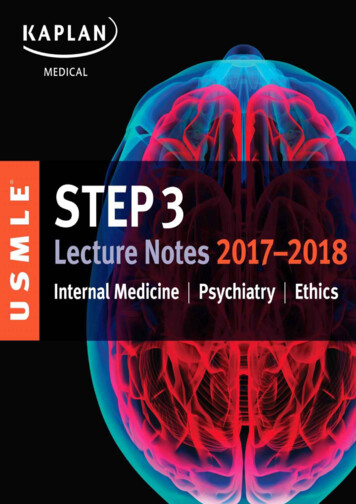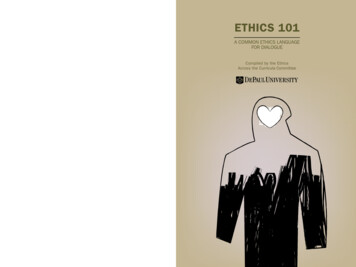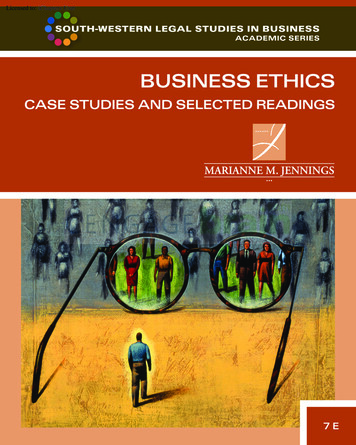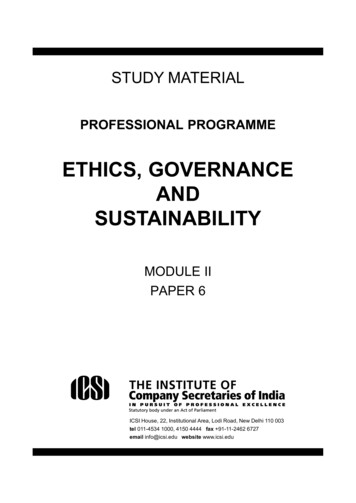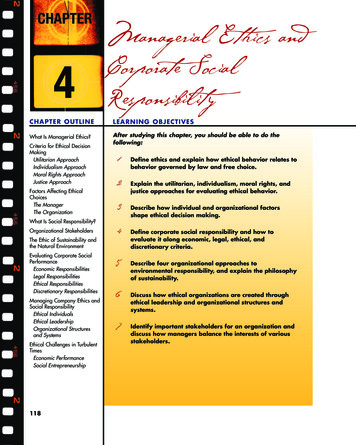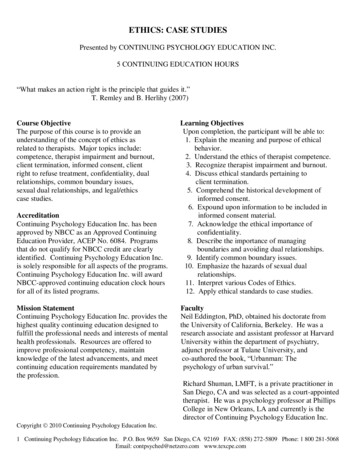
Transcription
ETHICS: CASE STUDIESPresented by CONTINUING PSYCHOLOGY EDUCATION INC.5 CONTINUING EDUCATION HOURS“What makes an action right is the principle that guides it.”T. Remley and B. Herlihy (2007)Course ObjectiveThe purpose of this course is to provide anunderstanding of the concept of ethics asrelated to therapists. Major topics include:competence, therapist impairment and burnout,client termination, informed consent, clientright to refuse treatment, confidentiality, dualrelationships, common boundary issues,sexual dual relationships, and legal/ethicscase studies.AccreditationContinuing Psychology Education Inc. has beenapproved by NBCC as an Approved ContinuingEducation Provider, ACEP No. 6084. Programsthat do not qualify for NBCC credit are clearlyidentified. Continuing Psychology Education Inc.is solely responsible for all aspects of the programs.Continuing Psychology Education Inc. will awardNBCC-approved continuing education clock hoursfor all of its listed programs.Mission StatementContinuing Psychology Education Inc. provides thehighest quality continuing education designed tofulfill the professional needs and interests of mentalhealth professionals. Resources are offered toimprove professional competency, maintainknowledge of the latest advancements, and meetcontinuing education requirements mandated bythe profession.Learning ObjectivesUpon completion, the participant will be able to:1. Explain the meaning and purpose of ethicalbehavior.2. Understand the ethics of therapist competence.3. Recognize therapist impairment and burnout.4. Discuss ethical standards pertaining toclient termination.5. Comprehend the historical development ofinformed consent.6. Expound upon information to be included ininformed consent material.7. Acknowledge the ethical importance ofconfidentiality.8. Describe the importance of managingboundaries and avoiding dual relationships.9. Identify common boundary issues.10. Emphasize the hazards of sexual dualrelationships.11. Interpret various Codes of Ethics.12. Apply ethical standards to case studies.FacultyNeil Eddington, PhD, obtained his doctorate fromthe University of California, Berkeley. He was aresearch associate and assistant professor at HarvardUniversity within the department of psychiatry,adjunct professor at Tulane University, andco-authored the book, “Urbanman: Thepsychology of urban survival.”Richard Shuman, LMFT, is a private practitioner inSan Diego, CA and was selected as a court-appointedtherapist. He was a psychology professor at PhillipsCollege in New Orleans, LA and currently is thedirector of Continuing Psychology Education Inc.Copyright 2010 Continuing Psychology Education Inc.1 Continuing Psychology Education Inc. P.O. Box 9659 San Diego, CA 92169 FAX: (858) 272-5809 Phone: 1 800 281-5068Email: contpsyched@netzero.com www.texcpe.com
ETHICS: CASE STUDIESINTRODUCTIONThe ethical considerations of therapists are becominggreater in number and complexity. Managed care requirespractitioners to consider issues of confidentiality and deliveryof competent treatment while other decisions may involveinformed consent, multiple relationships with clients, andbreaking confidentiality given clients’ dangerous behavior.These deliberations are occurring within a changing cultureas the populations which counselors treat are increasinglydiverse raising questions of competency and availability ofmental health services. Further, therapists are operating in asociety that is increasingly litigious, hence, the need forcodes of ethics by the various mental health professionalorganizations offering guidance is quite clear.Historically, the concepts of standards of practice andaccountability appear to have developed simultaneously withthe description of physician duties (and other occupations) inancient Egypt approximately 2000 B.C., as indicated in theCode of Hammurabi (American College of Physicians, 1984)in which a fee structure and punishments for poor resultswere recommended. The Hippocratic Oath, written roughly400 B.C., is a well-known example of a professional code ofethics that was formulated by members of the medicalprofession and indicated obligations of the professional to theprofession and to members of society. This physicians guideof that era professed some outdated doctrines such asforbidding removal of kidney stones but it also highlightedmaintaining confidentiality and avoiding sexual relationswith patients (patients of both sexes and slaves). TheHippocratic Oath promotes many of the key ethical principlesand values inherent in modern codes of ethics (Sinclair et al.,1996). The American Psychological Association (APA)began development of a code of ethics following World WarII given increased professional activity and public exposureof its members. The profession offered successful warrelated services such as creation of group tests to help thearmed services ascertain the draft eligibility of young menand delivery of mental health services to hospitalized soldiersupon returning home. The goal was to create a code thatwould “be effective in modifying human behavior specifically, the behavior of psychologists” (Hobbs, 1948, p.82). The process involved a critical incident technique ofasking APA members to use firsthand knowledge indescribing a situation whereby a psychologist made adecision having ethical implications and to express theaccompanying ethical issues. Nicholas Hobbs chaired thecommittee that reviewed over 1000 such incidents andidentified essential ethical themes relating to psychologists’relationships and responsibilities to others, including clients,students, research participants and other professionals.Hobbs articulated, “In a field so complex, where individualand social values are yet but ill defined, the desire to playfairly must be given direction and consistency by some rulesof the game. These rules should do much more than help theunethical psychologist keep out of trouble; they should be ofpalpable aid to the ethical psychologist in making daily2 Continuing Psychology Education Inc.decisions” (Hobbs, 1948, p. 81). Many of the reportedincidents mirrored the political atmosphere of the postwarera, for instance, the effects of McCarthyism on academicfreedom, and concerns of psychologists working in industrybeing asked to design tests that would maintain racialsegregation in the workplace. These incident reports led todrafting an ethical code which was debated in psychologydepartments and at state, regional and national professionalmeetings. The first formal APA code of ethics was adoptedin 1953, and it has undergone ten revisions. Currently, theEthics Committee adopts new standards based oncontemporary complaints and issues within the profession.The Codes of Ethics of the professional mental healthorganizations, including the National Association of SocialWorkers (NASW, 2008), American Association for Marriageand Family Therapy (AAMFT, 2015), American CounselingAssociation (ACA, 2014), and American PsychologicalAssociation (APA, 2010), serve to educate members aboutsound ethical conduct, professional accountability, andimproved practice through mandatory and aspirational ethics.Mandatory ethics describes compliance with the “musts” and“must nots” of the ethical standards and are enforceablewhereas aspirational ethics involves the highest standards ofconduct to which one can aspire, implies one understands themoral fiber behind the code, suggests doing more than theminimum requirement and they are not enforceable. NASW(2008) promotes the following aspirational ethics, termed“Ethical Principles” as ideals to which social workers mayaspire: Service – Helps people in need and addresses socialproblems Social Justice – Challenges social injustice Dignity and Worth of the Person – Respects theinherent dignity and worth of the person Importance of Human Relationships – Recognizes thecentral importance of human relationships Integrity – Acts in a trustworthy manner Competence – Practices within established areas ofcompetence and evolves professional expertiseThe following general principles guide the aspirationalethical conduct of ACA (2014) counselors: Autonomy – Counselors decrease client dependency andencourage independent decision making; they do notimpose their own goals, are accepting of different beliefsand values, and are not judgmental. Nonmaleficence – Do no harm, hence, counselors avoidtreatment that can potentially be harmful. Beneficence – Means to promote good and wellness,therefore, counselors foster the welfare and growth oftheir clientele. Justice – Fairness is implemented in professionalrelationships, including quality of care, allocation oftime and resources, fees, and counseling services. Fidelity – A trusting and therapeutic environment iscreated in the absence of deceit and exploitation. Veracity – Counselors interact truthfully with all of their
ETHICS: CASE STUDIESprofessional contacts.Professionals assume a fiduciary obligation with theirclients, implying a “special duty to care for the welfare ofone’s clients or patients” (Haas & Malouf, 1995, p. 2),therefore, the professional’s standard relative to moralprinciples is much higher than the ordinary citizen’s. Meara,Schmidt and Day (1996) believe that a virtuous professionalupholding a fiduciary relationship would: a) be motivated todo what is good, b) have vision and discernment, c) realizethe function of emotion in judging proper conduct, d) possessa high degree of self-understanding and awareness, and e)comprehend the mores of his or her community and thelegitimacy of client diversity (pp. 28-29). Contrarily,Koocher and Keith-Spiegel (2008) list characteristics ofpractitioners who demonstrate questionable, unethical orunprofessional behavior:1. Are unaware or misinformed of the ethical standards2. Offer treatment outside the scope of their practice3. Display insensitivity to the needs of others or to situationaldynamics4. Exploit clients by putting their own needs first5. Act irresponsibly due to stress, laziness, non-awareness,or inattention6. React with vengeance against clients for perceived harm7. Experience burn-out or other emotional impairment8. Reveal interpersonal boundary issues9. Are self-serving10. Generally, are ethical but occasionally blunder resultingfrom oversight or distractionHerlihy and Corey (1996) advise therapists to be wary ofunethical or questionable behavior such as extending thenumber of therapy sessions to fulfill their own emotional orfinancial needs; being unaware of countertransferencereactions to a client thereby heightening resistance andslowing growth; impressing values on clients incongruentwith their cultural background; utilizing techniques orstrategies comfortable for therapist but not necessarilyfunctional for client; and practicing with apathy and littleenthusiasm. Golden (1992) observed that many ambiguitiesmay abound during therapy, thus “When we find ourselvesnavigating in waters that are not clearly charted by ourprofession’s ethical codes, we must be guided by an internalethical compass.”This course uses cases that have been adapted from actualincidents to illustrate realistic and common ethical issuesfacing practitioners; the names have been omitted to protectthe privacy of those involved except when cases are alreadypublic information through books, newspapers, or media.Codes of ethics, which represent moral principles created bythe various mental health organizations to provide guidancefor right conduct and are binding on their members, and keyliterature, are utilized to assist practitioners in making soundethical decisions promoting the welfare and best interests oftheir clients and to avoid ethical conflicts.3 Continuing Psychology Education Inc.COMPETENCEClients disclose their most personal secrets and strugglesduring therapy thus placing themselves in a vulnerableposition requiring therapist competence. “When clients puttheir trust in us as professionals, one of their mostfundamental expectations is that we will be competent”(Pope & Vasquez, 1991, p. 51). Competent professionalsuphold two essential ethical principles: beneficence, which isattempting to do only good for the client, andnonmaleficence, which is never doing harm. Welfel (2006)believes that competence includes a combination ofknowledge, skill, and diligence. Effective practice requiresintellectual and emotional competence (Pope & Brown,1996). The intellectual component consists of attaining aknowledge base, assessing and planning effective treatmentfor a client or issue, and understanding one’s therapeuticlimitations (i.e., a child specialist may lack skills required forolder adults). Emotional competence relates to managingclinical information, personal biases, and self-care (Pope,Sonne, & Greene, 2006; Welfel, 2006). The concept ofcompetence has been difficult to define, though many effortshave manifested through the development of ethics codes,standards of practice and practice guidelines, third-partypayer quality assurance programs, state licensing andcertification boards (Packard, Simon, & Vaughn, 2006), andspecialized credentialing authorities. Nonetheless, uniformagreement within the mental health field on the definition ofcompetence is lacking (Claiborn, 1982; Kaslow, 2004).Additionally, incompetence is often difficult to prove giventhe legal requirements of due process and supportiveevidence.Peterson and Bry (1980) studied competence by examiningappraisals of 126 Ph.D. students by 102 faculty andsupervisors. The dominant characteristic for “outstanding”trainees was “high intelligence” and “lack of knowledge” forincompetent trainees. Supervisors rated students thefollowing year and determined the following four factors ascentral to competence: professional responsibility,interpersonal warmth, intelligence, and experience.The minimum competence standards for therapists arebased on academic training and supervised experienceculminating in professional licensure. The counselor’slicense does not specify the type of clients, issues, orinterventions he or she may address, instead, the practitioneris ethically obligated to restrict practice to areas ofqualification based on training and experience. Attorneysand physicians are not competent to practice in every aspectof law and medicine, likewise, psychotherapists are notcompetent to treat all people for all issues (Brenner, 2006;Halderman, 2006; Maxie, Arnold, & Stephenson, 2006). Theethical codes of the mental health organizations cite thefollowing regarding competence:Social workers should provide services and represent themselves ascompetent only within the boundaries of their education, training, license,certification, consultation received, supervised experience, or other relevantprofessional experience (NASW, 2008, 1.04.a.).
ETHICS: CASE STUDIESMarriage and family therapists maintain competence in marriage andfamily therapy through education, training, and/or supervised experience(AAMFT, 2015, 3.1).Counselors practice only within the boundaries of their competence, basedon their education, training, supervised experience, state and nationalprofessional credentials, and appropriate professional experience(ACA, 2014, C.2.a.).Psychologists provide services, teach, and conduct research with populationsand in areas only within the boundaries of their competence, based on theireducation, training, supervised experience, consultation, study, orprofessional experience (APA, 2010, 2.01.a.).Competence also has legal implications because societyexpects practitioners to be competent and it upholds thesehigh standards through licensing boards and the court system.Counselor incompetence is the second most often reportedarea of ethical complaint (dual relationships is first) asindicated by Neukrug, Millikin, & Walden (2001). Givenclient harm, a therapist is open to lawsuit for malpractice andcan be legally responsible in a court of law; many suchlawsuits focus on competence. Therapists are encouraged tobe cognizant of guidelines or standards applicable to theirareas of specialization as a best practice for demonstratingprofessional competence and lowering liability risks (Bennettet al., 2007).Koocher & Keith-Spiegel (2008) present the following fivecases:Case 1-1: Therapist had practiced individual psychoanalysisfor ten years. After completion of a four-hour continuingeducation workshop on family therapy, she offered familytherapy sessions to some clients while reading books in thisfield in her spare time.Case 1-2: Counselor treated a woman for six months withvarious adjustment issues following a separation andupcoming divorce. Client’s attorney asked therapist to testifythat client should receive child custody of her 7 year-old.Therapist lacked previous forensic experience or training butfrom the witness stand he offered opinions about theadjustment of client and her child. Client’s husband filed anethical complaint against therapist on the grounds that helacked training in child work and he never interviewed thechild, thus he was negligent in offering an opinion.Furthermore, this therapist did not attain information fromanother therapist who was seeing the child, nor from thechild’s father.Case 1-3: Practitioner completed graduate training in the1970s, before clinical neuropsychology evolved as aspecialty with more advanced assessment tools. She has notstudied neuroanatomy and her practice is mainly inpsychotherapy. She accepted an attorney’s referral to assessa client who sustained a closed head injury and resultinglanguage, memory, and perceptual sequellae and she used her1970s techniques.Analysis: In each case, therapist did not identify the limit orscope of his or her practice and training which led to crossingethical boundaries. The first case reveals a counselor lackingin minimum competence levels, training and experience. Herefficacy would only come into question if a formal complaintwas filed, nonetheless, therapists have an ethicalresponsibility to practice in specialty areas that are new tothem only after obtaining suitable education, training and4 Continuing Psychology Education Inc.supervised experience, and precautions must be taken toensure competent work during the learning process. In thesecond case, practitioner was not cognizant of forensicpractice or expert witness requirements that could havecreated negative outcomes for all involved. He violatedAPA’s ethic code (APA 2010: 9.01.a) which states,“Psychologists base the opinions contained in theirrecommendations, reports, and diagnostic or evaluativestatements, including forensic testimony, on information andtechniques sufficient to substantiate their findings” and ethicscode (APA 2010: 9.01.b) that professes, “ Psychologistsprovide opinions of the psychological characteristics ofindividuals only after they have conducted an examination ofthe individuals adequate to support their statements orconclusions.” The therapist in the third instance had not keptcurrent with newer neuropsychologial assessment techniquesand appeared unaware of expert witness ethicalresponsibilities. In such situations, practitioners are advisedto seek formal education, training, consultation orsupervision with an expert in that specialty. Considering thatcompetence is difficult to define and assess, self-monitoringis an effective method to ensure quality therapeutic service asreflected in these ethics codes:Psychologists planning to provide services, teach, or conduct researchinvolving populations, areas, techniques, or technologies new to themundertake relevant education, training, supervised experience, consultation,or study (APA, 2010, 2.01.c.).Counselors continually monitor their effectiveness as professionals and takesteps to improve when necessary. Counselors take reasonable steps to seekpeer supervision as needed to evaluate their efficacy as counselors (ACA,2014, C.2.d.).While developing new skills in specialty areas, marriage and familytherapists take steps to ensue the competence of their work and to protectclients from possible harm. Marriage and family therapists practice inspecialty areas new to them only after appropriate education, training, and/orsupervised experience (AAMFT, 2015, 3.6).Social workers should provide services in substantive areas or useintervention techniques or approaches that are new to them only afterengaging in appropriate study, training, consultation, and supervision frompeople who are competent in those interventions or techniques (NASW,2008, 1.04.b.).Case 1-4: Therapist performed a cognitive evaluation of anadult utilizing the Wechsler Adult Intelligence Scale-Revised(WAIS-R), four years after the revised WAIS-III waspublished. He responded, “They’re about the same, and thenew kit is too expensive.”Case 1-5: Counselor continued treating his child clients withlong-term psychotherapy for secondary reactive enuresisdespite significant evidence that certain behavioral treatmentsare very effective in a brief time. When confronted with thisinformation, he seemed surprised and then researched theprofessional literature.Analysis: Both therapists are offering below-standardtreatment resulting from failure to keep abreast withadvancements in the field. The first therapist rationalized hisperformance, combining ignorance and arrogance. Thesecond practitioner was completely unaware but at leastinterested in updating his knowledge base; even if the newtechnique poses professional or theoretical concerns from thiscounselor’s view, he has the ethical responsibility to inform
ETHICS: CASE STUDIESclients of this alternative while offering recommendations.Ethically, practitioners must maintain current skills andvigilance of progress within their areas of practice.Case 1-6: Mr. Austin hired Dr. Dale in a child custody casein the hope of taking custody of his two sons, aged 9 and 11,from his ex-wife, Mrs. Romero, who held custody. Dr. Daleevaluated Mr. Austin, his current wife and the two children.In court, Dr. Dale testified that Mr. Austin and his wifewould be better parents and should have custody of thechildren and Mrs. Romero should have limited visitationrights. He said the boys preferred their father over theirmother. Dr. Dale never evaluated Mrs. Romero or hercurrent husband, rather, all such information was gainedsecondhand. The psychologist for Mrs. Romero highlightedthat she had custody of the children before the current trial,Mr. Austin infrequently saw the children, and he infrequentlypaid his child support. Dr. Dale ignored hospital records sentto him by Mrs. Romero indicating the fact that Mr. Austinwas an alcoholic and was probably still drinking. Mrs.Romero lost custody of the children at the trial. She thenreceived letters from her children stating that their father wasdrinking heavily and beating his second wife – the samereasons why Mrs. Romero divorced Mr. Austin. Mrs.Romero is Anglo but her current husband is MexicanAmerican; she wondered if that tainted Dr. Dale’s evaluation.Analysis: Dr. Dale appears to have violated the same twoethics codes as in Case 1-2, demonstrated by his conclusionsabout Mrs. Romero and her current husband without previousevaluation. He also chose to ignore Mr. Austin’s history ofalcoholism. Whether he lacked forensic experience, was lazyin collecting information, or was biased against certaingroups, the displayed incompetence produced dismalconsequences for Mrs. Romero and her family (Kitchener,2000).Successful graduation from an accredited graduate programdoes not necessitate or guarantee competence (Kitzow,2002). Determining competence with respect to varioustypes of clients and issues is a decision requiring ethical andprofessional integrity often made by the individualprofessional. The ethics codes indicate the followingconcerning developing new skills:(AAMFT, 2015, 3.6 – already cited).When generally recognized standards do not exist with respect to anemerging area of practice, social workers should exercise careful judgmentand take responsible steps (including appropriate education, research,training, consultation, and supervision) to ensure the competence of theirwork and to protect clients from harm (NASW, 2008, 1.04.c.).Counselors practice in specialty areas new to them only after appropriateeducation, training, and supervised experience. While developing skills innew specialty areas, counselors take steps to ensure the competence of theirwork and protect others from possible harm (ACA, 2014, C.2.b.).(APA, 2010, 2.01.c – already cited.).Case 1-7: A 35 year-old woman with a diagnosis ofpsychomotor epilepsy and multiple personality disorder fileda complaint with the APA Ethics Committee against herpsychologist of four years for practicing outside her areas ofcompetence. Client claimed that she discovered that herpsychologist did not have prior training or supervised5 Continuing Psychology Education Inc.experience in her multiplicity of issues; client’s conditionworsened during treatment leading to hospitalization.Psychologist informed the Ethics Committee that she begantreatment as an employee of a community mental healthcenter and was under supervision of two clinic consultants: aneurologist who controlled client’s medication and apsychiatrist experienced in multiple personality disorders.Psychologist started a private practice during the third year oftherapy with client and was advised by psychiatrist to allowclient to remain with the clinic while the clinic administrator,who was not a psychologist, recommended psychologist towork with client in private practice to avoid disruption oftreatment. Psychologist continued therapy with client inprivate practice and kept the same psychiatrist forconsultation as needed. After six months of therapyproceeding well, client began decompensating. Client calledpsychologist late one night threatening suicide because shefelt hopeless and she blamed psychologist for not being morehelpful. Psychologist called the police who took client to thecounty psychiatric hospital emergency room wherepsychologist met her and stayed with her until she wasadmitted. Psychologist continued therapy with client at thehospital until client refused to see psychologist. Clientultimately returned to the community mental health center fortherapy with a different practitioner.Psychologist informed the APA Ethics Committee that sheacted professionally and responsibly as evidenced by herconsultations with the psychiatrist and that the clinicadministrator recommended she take client into her privatepractice.Adjudication: The APA Ethics Committee foundpsychologist in violation of the principles of competence andresponsibility. She tried to operate beyond the limits of hercompetence and used mistaken judgment in seeing the clientin private practice as opposed to allowing client to continuein the more structured environment of the clinic wheretrained staff to deal with this issue was extant – as thepsychiatrist had advised. Further, she did not take fullresponsibility for the consequences of her actions bytransferring responsibility for her decisions to other parties –who were not psychologists. Psychologist was censured withstipulation to take two advanced courses: organicdisturbances and diagnosis and treatment of borderlinepersonality and multiple personality disorders. Psychologistaccepted the censure and stipulations (APA, 1987).Case 1-8: Psychologist A charged Psychologist B, a newPh.D. in social psychology, with performing duties beyondhis level of competence. B received a license based on twoyears experience performing research in a private mentalhospital, and he then opened a psychotherapy practice. Theprivate mental hospital’s administrator was abusinesswoman, not licensed in psychology, and shedesignated B as chief psychologist, a title that B used as acredential. B informed the APA Ethics Committee that hisstate psychology license was generic, thereby, having nolimits on practice, and his two-year work experience at the
ETHICS: CASE STUDIESmental hospital trained him to practice psychotherapy and actas chief psychologist. He claimed psychologist A wassimply professionally jealous.Adjudication: The APA Ethics Committee declaredPsychologist B was practicing outside his area of competenceand was not accurately representing his education, trainingand experience. He was censured with the stipulation that hecease and desist from practicing psychotherapy and fromutilizing the title of chief psychologist. Psychologist B didnot reply to the censure and stipulation, consequently, theCommittee voted that he be dropped from Associationmembership for violation of the above ethics standards andfor failure to cooperate (APA, 1987).Case 1-9: Mrs. A filed a complaint against her husband’stherapist, Psychologist C, charging that he was disseminatingoutdated ideas and values regarding women and marriage.Mrs. A’s husband was in therapy for a depressive reactionafter the death of his father. After six months, the coupleexperienced marital difficulties and the husband requested hiswife attend several sessions. Mrs. A suspected thatPsychologist C’s “old-fashioned” and patriarchal maritalviews were causing the marital strife. She informed the APAEthics Committee of C’s views on marriage as follows: thewoman is to be subservient and obedient, only “radicalfeminists” believe in the women’s movement, a woman’scareer is a marital handicap, and she quoted C’s statementstoward sexual relations indicating insufficient knowledge offemale sexuality. The complainant reported that C helpedher husband with the loss of his father but his antiquatedmarriage views almost destroyed her marriage and she wasconcerned for the welfare of future marital clients. TheEthics Committee questioned Psychologist C about his initialtraining and continued exposure to the themes of marriageand women. He expressed a lack of contemplating theissues, but the current situation led him to appreciate Mrs.A’s criticisms culminating
1 Continuing Psychology Education Inc. P.O. Box 9659 San Diego, CA 92169 FAX: (858) 272-5809 Phone: 1 800 281-5068 Email: contpsyched@netzero.com www.texcpe.com ETHICS: CASE STUDIES Presented
